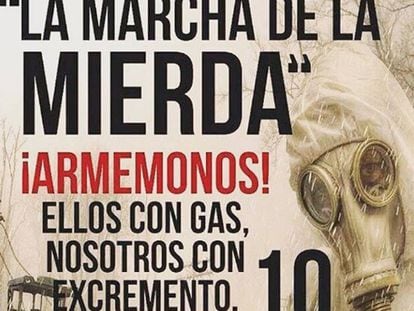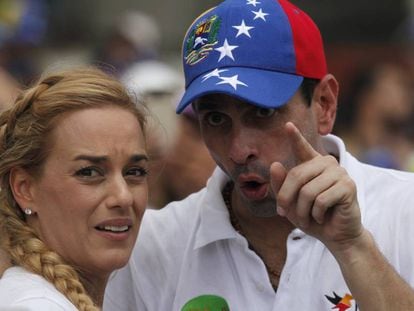Venezuela’s naked protester and other forms of non-violent resistance
Three demonstrators who have become symbols of the struggle against the Maduro regime tell their story
To date, at least 39 people have died in the wave of protests against the government of President Nicolás Maduro that have rocked Venezuela over the last six weeks. There have also been more than 700 people injured and hundreds of arrests.
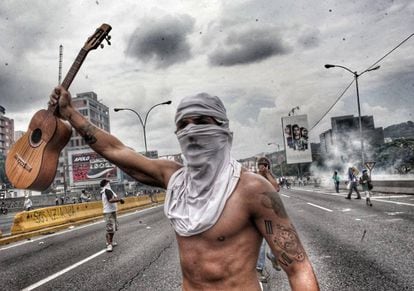
Despite being met by military police firing tear-gas and live ammunition, as well as armed civilians working with the authorities, some protesters have taken a resolutely non-violent approach in registering their opposition to the ruling United Socialist Party’s attempts to sideline the National Assembly by creating a new assembly to rewrite the Constitution in the South American country.
Tomás Vivas, a 29-year-old artist, moved to Caracas from the southern state of Mérida. “Where I come from there are fewer employment opportunities,” he says, adding that during the first mass street protests in early 2014 he decided to take his cuatro, a traditional Venezuelan four-stringed guitar, along to demonstrations, where he improvises songs.
“I played joropo (a form typical of Venezuela and Colombia). A lot of the time people don’t listen, particularly when I am trapped in the firing line between demonstrators and police. But it doesn’t matter, I keep playing,” he says, adding: “Everybody should stage the protest that suits them, but I think that pacifism is the most effective way.”
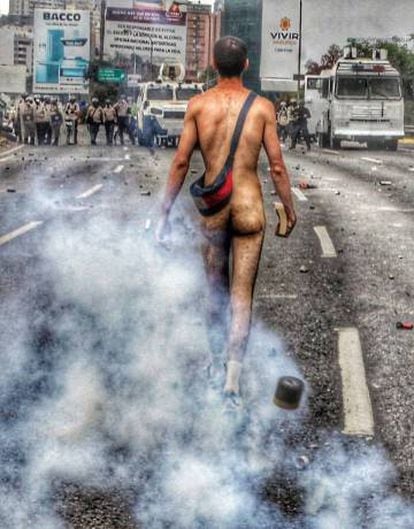
Hans Wuerich, aged 27, has been hailed as a hero after he decided, more than two weeks ago to strip naked during a baton charge by police in Caracas. “I had thought about different ways to protest peacefully. I don’t believe in violence as a way out of this crisis, because that gives the government excuses to crack down,” he says.
As chaos erupted around him during the military assault on protesters who had staged a road block, Wuerich removed his clothes, and holding a Bible, approached an armored car surrounded by soldiers and called on them to stop. In response, they fired buckshot at him.
President Maduro ridiculed Wuerich during a recent speech broadcast on television and radio: “There is no limit to your ridiculousness… Thank goodness he didn’t drop the soap because the photo would have been detestable. Horrible.”
Wuerich says Maduro’s comments reveal weakness: “Peaceful protests hit dictatorships hard. Maduro can try to insult us, but he knows that he is a demon who has been weakened.” Other protesters have approached Wuerich during the protests to have their photograph taken with him and to show support. His opposition to the government is based on the same reasons as most other protesters: an economy in free-fall, in part due to lower oil prices, in part due to disastrous policies; food and medicine shortages, growing numbers of political prisoners, and moves to shut down the National Assembly, among others.
Wuerich left his parents’ home a year ago. “Like most Venezuelans, I can’t make ends meet. I was living alone for four months. The crisis makes it hard for young people to leave home and make a life for themselves,” he explains.
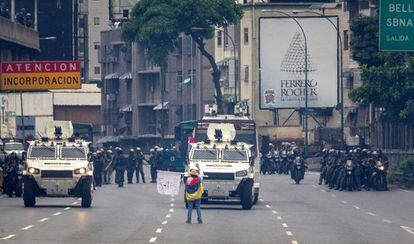
María José Castro, a 54-year-old Portuguese national who lives in Caracas, was taking part in a march on May 3 when troops began firing tear gas canisters into the crowd. Wrapped in a Venezuelan flag, she began walking toward an armored car.
“I felt that I had become the mother of those kids who were protesting. It hurt me to see how they fired on them! When I heard the soldiers order the armored cars to move forward, I thought a massacre was going to take place and so I moved,” she says.
I felt I had become the mother of those kids who were protesting María José Castro, protester
By standing her ground, she brought an armored car to a halt, echoing the photograph of the student who halted a tank during the 1989 protests in Tiananmen Square. Since then, she has become “the tank woman” and a powerful symbol of the resistance to the Maduro regime.
“My life was in the hands of God, not the soldiers. When I was very young I had to leave Portugal because of a dictatorship, now I know that we have to fight. We cannot allow a tyrant to seize control of a nation. Venezuela has given so much to the world, taken in foreigners like myself, and that is why I will not abandon my country,” concludes Castro.
English version by Nick Lyne.
